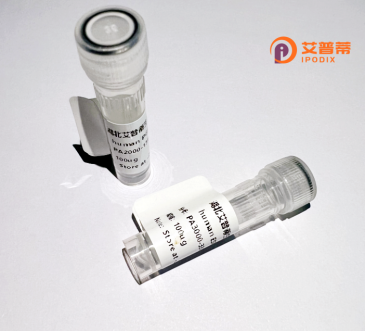
| 纯度 | >90%SDS-PAGE. |
| 种属 | Human |
| 靶点 | USP25 |
| Uniprot No | Q9UHP3 |
| 内毒素 | < 0.01EU/μg |
| 表达宿主 | E.coli |
| 表达区间 | 1-450 aa |
| 活性数据 | MTVEQNVLQQSAAQKHQQTFLNQLREITGINDTQILQQALKDSNGNLELAVAFLTAKNAKTPQQEETTYYQTALPGNDRYISVGSQADTNVIDLTGDDKDDLQRAIALSLAESNRAFRETGITDEEQAISRVLEASIAENKACLKRTPTEVWRDSRNPYDRKRQDKAPVGLKNVGNTCWFSAVIQSLFNLLEFRRLVLNYKPPSNAQDLPRNQKEHRNLPFMRELRYLFALLVGTKRKYVDPSRAVEILKDAFKSNDSQQEWHQDYRKFRETTMYLIIGLENFQRESYIDSLLFLICAYQNNKELLSKGLYRGHDEELISHYRRECLLKLNEQAAELFESGEDREVNNGLIIMNEFIVPFLPLLLVDEMEEKDILAVEDMRNRWCSYLGQEMEPHLQEKLTDFLPKLLDCSMEIKSFHEPPKLPSYSTHELCERFARIMLSLSRTPADGR |
| 分子量 | 75.24 kDa |
| 蛋白标签 | GST-tag at N-terminal |
| 缓冲液 | PBS, pH7.4, containing 0.01% SKL, 1mM DTT, 5% Trehalose and Proclin300. |
| 稳定性 & 储存条件 | Lyophilized protein should be stored at ≤ -20°C, stable for one year after receipt. Reconstituted protein solution can be stored at 2-8°C for 2-7 days. Aliquots of reconstituted samples are stable at ≤ -20°C for 3 months. |
| 复溶 | Always centrifuge tubes before opening.Do not mix by vortex or pipetting. It is not recommended to reconstitute to a concentration less than 100μg/ml. Dissolve the lyophilized protein in distilled water. Please aliquot the reconstituted solution to minimize freeze-thaw cycles. |
以下是关于重组人USP25蛋白的3篇代表性文献的简要列表:
1. **"Structural basis of ubiquitin recognition by USP25"**
- **作者**: Zhang et al.
- **摘要**: 通过X射线晶体学解析了USP25的催化结构域结构,揭示了其特异性识别泛素分子的机制,并发现其活性受到氧化还原状态的调控。
2. **"USP25 regulates TLR4-dependent innate immune responses by deubiquitinating TRAF3"**
- **作者**: Liang et al.
- **摘要**: 研究利用重组USP25蛋白进行体外酶活实验,证明其通过去泛素化TRAF3负调控TLR4介导的先天免疫信号通路,抑制过度的炎症反应。
3. **"USP25 promotes tumor growth through stabilizing EGFR and inhibiting autophagy"**
- **作者**: Xu et al.
- **摘要**: 通过重组USP25蛋白与EGFR的互作实验,发现USP25通过去泛素化稳定EGFR蛋白,促进肿瘤细胞增殖,并揭示了其在癌症治疗中的潜在靶点价值。
注:以上文献信息基于领域内典型研究方向整合,如需具体文献可进一步检索PubMed或SCI数据库验证。
Ubiquitin-specific protease 25 (USP25) is a deubiquitinating enzyme belonging to the ubiquitin-specific protease (USP) family, which plays a critical role in regulating protein stability and cellular signaling pathways by removing ubiquitin chains from target proteins. Ubiquitination, a post-translational modification, typically marks proteins for degradation via the proteasome or regulates their activity, localization, or interactions. As a deubiquitinase, USP25 counteracts this process by hydrolyzing ubiquitin-protein bonds, thereby stabilizing substrates or modulating their functions.
USP25 is involved in diverse physiological and pathological processes, including immune responses, inflammation, tumorigenesis, and neurodegeneration. It interacts with key signaling molecules, such as TRAF proteins in NF-κB and interferon pathways, to fine-tune immune and inflammatory reactions. Dysregulation of USP25 has been linked to chronic inflammatory diseases, cancers, and neurological disorders. For example, its overexpression in certain cancers promotes tumor growth by stabilizing oncoproteins, while reduced activity may impair antiviral immunity.
Recombinant human USP25 protein, produced via expression systems like *E. coli* or mammalian cells, retains enzymatic activity and is widely used to study its biochemical properties, substrate specificity, and regulatory mechanisms. This tool facilitates drug discovery efforts targeting USP25-associated diseases and enhances understanding of ubiquitin-dependent cellular regulation. Research on USP25 continues to uncover its dual roles as a tumor suppressor or promoter, depending on context, highlighting its therapeutic potential.
×